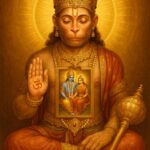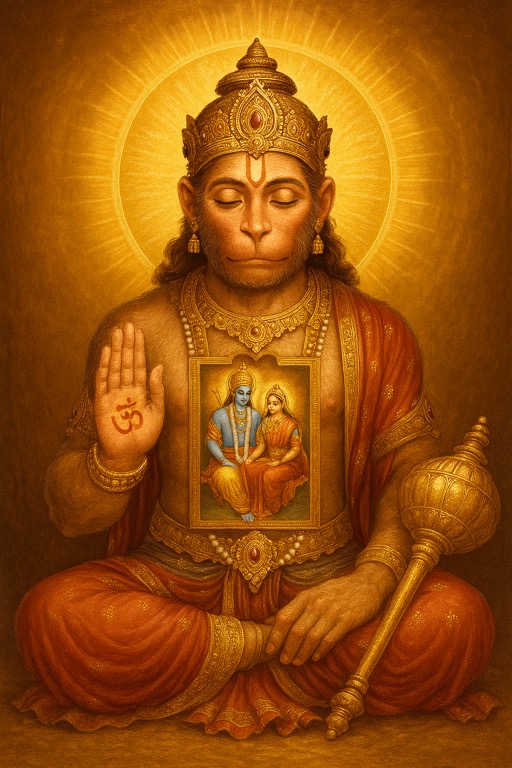
Hanuman Jayanti, also called Hanuman Janmotsav, is a Hindu festival celebrating the birth of the Hindu deity, and one of the protagonists of the Ramayana and its many versions, Hanuman.
The celebration of Hanuman Jayanti varies by time and tradition in each state of India. In most northern states of India, the festival is observed on the full-moon day of the Hindu month of Chaitra (Chaitra Purnima).
Source: Wikipedia

SRI HANUMAN is worshipped all over India–either alone or together with Sri Rama. Every temple of Sri Rama has the murti or idol of Sri Hanuman. Hanuman was the Avatara of Lord Siva. He was born of the Wind-God and Anjani Devi. He is also called by the names Pavanasuta, Marutsuta, Mahavira, Bajrangabali and Pavankumar.
Hanuman was the living embodiment of the power of Ram-Nam. He was an ideal selfless worker, a true Karma Yogi who worked desirelessly. He was a great devotee and an exceptional Brahmachari or celibate. He served Sri Rama with pure love and devotion, without expecting any fruit in return. He lived only to serve Sri Rama. He was humble, brave and wise. He possessed all the divine virtues. He did what others could not do–crossing the ocean simply by uttering Ram-Nam, burning the demon-king’s city of Lanka, and bringing the sanjeevini herb to restore the life of Lakshmana. He brought Sri Rama and Lakshmana from the nether world after killing Ahiravana.
Hanuman possessed devotion, knowledge, spirit of selfless service, power of celibacy, and desirelessness. He never boasted of his bravery and intelligence.
He said to Ravana, “I am a humble messenger of Sri Rama. I have come here to serve Sri Rama, to do His work. By the command of Sri Rama, I have come here. I am fearless by the Grace of Sri Rama. I am not afraid of death. I welcome it if it comes while serving Sri Rama.”
See how humble Hanuman was! How deep was his devotion to Sri Rama! He never said, “I am the brave Hanuman. I can do anything and everything.”
Sri Rama Himself said to Hanuman, “I am greatly indebted to you, O mighty hero. You did marvellous, superhuman deeds. You do not want anything in return. Sugriva has his kingdom restored to him. Angada has been made the crown prince. Vibhishana has become king of Lanka. But you have not asked for anything at any time. You threw away the precious garland of pearls given to you by Sita. How can I repay My debt of gratitude to you? I will always remain deeply indebted to you. I give you the boon of everlasting life. All will honour and worship you like Myself. Your idol will be placed at the door of My temple and you will be worshipped and honoured first. Whenever My stories are recited or glories sung, your glory will be sung before Mine. You will be able to do anything, even that which I will not be able to!”
Thus did Sri Rama praise Hanuman when the latter returned to Him after finding Sita in Lanka. Hanuman was not a bit elated. He fell in prostration at the holy feet of Sri Rama.
Sri Rama asked him, “O mighty hero, how did you cross the ocean?”
Hanuman humbly replied, “By the power and glory of Thy Name, my Lord.”
Again Sri Rama asked, “How did you burn Lanka? How did you save yourself?”
And Hanuman replied, “By Thy Grace, my Lord.”
What profound humility Hanuman embodied in himself!
There are many who want wealth in return for their services. Some do not want wealth, but they cannot resist name and fame. Others do not want any of these, but they want approbation. Still others want nothing, but they boast of their deeds. Hanuman was above all these. That is why he is recognised as an ideal Karma Yogi and an unsurpassed adept in Bhakti. His life is full of object lessons. Everyone should try his best to follow the noble example of Hanuman.
Source: Swami Shivananda
***
In Hindu symbolism, a monkey signifies the human mind, which is ever restless and never still. This monkey mind happens to be the only thing over which man can have some control. We cannot control the world around us but we can control and tame our mind by strict discipline. We cannot control the way our environment behaves, but we can choose the way we respond to it. Truly, Hanuman is symbolic of the perfect mind and embodies the highest potential it can achieve. He is the true prototype of the “sthita prajña,” or the enlightened man of the Bhagavad Gita, as he had perfect control over his mind. His name gives a clue to his character. It is composed of the two Sanskrit words, “han” and “man.” “Hanan” means to annihilate and “man” stands for mind, in Sanskrit. It is only to be expected that Hanuman was born on Chitra Pournami day, has all the astrological aids for controlling the mind and shaking off our negative tendencies and acquiring positive tendencies. According to “yoga,” the body is controlled by the mind.
Consequently, we find that Hanuman who had perfect control over his mind also had a most developed body. Because of this, he is known as “Bajarangabali” – one whose body is like the thunderbolt and whose movements are like lightning. He is so strong that he can move mountains and so agile that he can leap across the sea. The twelve postures of yoga, known as “surya namaskar” or salutation to the sun, are supposed to have been composed by Hanuman in honour of his celestial Guru – Surya, the Sun God. His father, Vayu, the god of wind taught him the science of breath control known as “pranayama,” which is essential for controlling the mind.
Hanuman is an example of the perfect shishya or disciple – totally focused, hardworking, determined, brilliant, yet humble. He never flaunted his brilliance and scholarship but always sat at the feet of his Lord – Rama, ever the humble servant. He had no desire for name and fame. Even though he lived in a palace with Rama, he preferred the solitude of the mountains and forests and never indulged his senses but lived like a hermit – the supreme Brahmachari (celibate). He had perfect control of his mind which was achieved by his disciplined lifestyle and by his strict adherence to celibacy and selfless devotion. He controlled his mind through absolute faith in his deity. Every event in his life, whether good or bad, was considered as a gift from his master and was accepted without question. It is the perfect example of a true devotee of God.
He was also the ideal karma yogi – one who performed all actions without expectation of personal benefit, dedicating the results to his Lord, Rama. All his feats were for the sake of others, never for himself.
The one thing we can ask of him on this day is to uplift our spiritual qualities and give us unswerving devotion to God by which alone we can conquer ourselves as well as remove the bad karmas of our past!
Glory to Hanuman! Glory to his Lord, Sri Rama!
Om Sri Hanumate Namah
Source: Vanamali